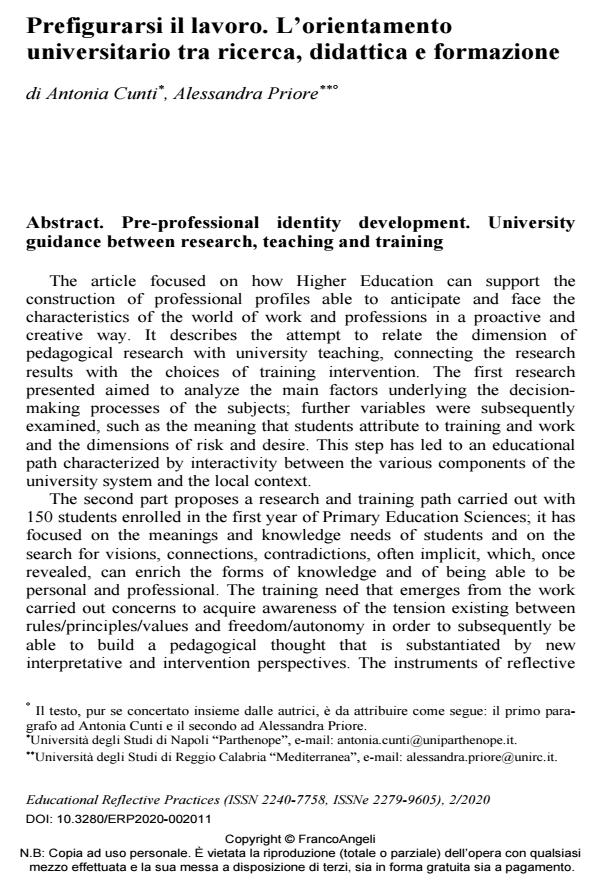Prefigurarsi il lavoro. L’orientamento universitario tra ricerca, didattica e formazione
Titolo Rivista EDUCATIONAL REFLECTIVE PRACTICES
Autori/Curatori Antonia Cunti, Alessandra Priore
Anno di pubblicazione 2021 Fascicolo 2020/2
Lingua Italiano Numero pagine 18 P. 178-195 Dimensione file 232 KB
DOI 10.3280/ERP2020-002011
Il DOI è il codice a barre della proprietà intellettuale: per saperne di più
clicca qui
Qui sotto puoi vedere in anteprima la prima pagina di questo articolo.
Se questo articolo ti interessa, lo puoi acquistare (e scaricare in formato pdf) seguendo le facili indicazioni per acquistare il download credit. Acquista Download Credits per scaricare questo Articolo in formato PDF

FrancoAngeli è membro della Publishers International Linking Association, Inc (PILA)associazione indipendente e non profit per facilitare (attraverso i servizi tecnologici implementati da CrossRef.org) l’accesso degli studiosi ai contenuti digitali nelle pubblicazioni professionali e scientifiche
The article focused on how Higher Education can support the construction of professional profiles able to anticipate and face the characteristics of the world of work and professions in a proactive and creative way. It describes the attempt to relate the dimension of pedagogical research with university teaching, connecting the research results with the choices of training intervention. The first research presented aimed to analyze the main factors underlying the decisionmaking processes of the subjects; further variables were subsequently examined, such as the meaning that students attribute to training and work and the dimensions of risk and desire. This step has led to an educational path characterized by interactivity between the various components of the university system and the local context. The second part proposes a research and training path carried out with 150 students enrolled in the first year of Primary Education Sciences; it has focused on the meanings and knowledge needs of students and on the search for visions, connections, contradictions, often implicit, which, once revealed, can enrich the forms of knowledge and of being able to be personal and professional. The training need that emerges from the work carried out concerns to acquire awareness of the tension existing between rules/principles/values and freedom/autonomy in order to subsequently be able to build a pedagogical thought that is substantiated by new interpretative and intervention perspectives. The instruments of reflective training are certainly useful in generating transformative learning of the beliefs and related emotions that accompany the growth of professional identity.
- Clinical research: the great absentee of the Italian University training programs? Stefano Stabile, Veronica Franchina, Rosita Cenna, Valentina Sinno, Francesca Mannozzi, Irene Federici, Sara Testoni, Celeste Cagnazzo, in AboutOpen /2023 pp.64
DOI: 10.33393/ao.2023.2566
Antonia Cunti, Alessandra Priore, Prefigurarsi il lavoro. L’orientamento universitario tra ricerca, didattica e formazione in "EDUCATIONAL REFLECTIVE PRACTICES" 2/2020, pp 178-195, DOI: 10.3280/ERP2020-002011